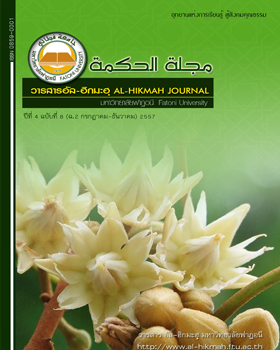Emotional Quotient and Self Adjustment of the First year Nursing students of Boromarajonani College of Nursing,Yala
Keywords:
Emotional Quotient (EQ), Self Adjustment, Nursing StudentAbstract
This study was a descriptive study aimed at investigating the relationship between Emotional Quotient (EQ) and Self Adjustment of the first year nursing students. Population consisted of 79 nursing students who were studying in a Bachelor of Nursing Sciences Program in academic year 2012 at Boromarajonani College of Nursing , Yala. The Emotional Quotient questionnaire and the self adjustment test were used. The reliabilities of those questionnaires were 0.85 and 0.75 consecutively. Data were analyzed using descriptive statistics and Pearson Correlation Coefficient. The results showed that :
- The majority of nursing students (50.65%) had overall EQ scores at the average level.
- Most nursing students had Good EQ score, Smart EQ score and Happy EQ score at the average level with the percentages of those scores as 53.16%, 73.42%, and 69.60% respectively.
- Nursing students had the overall scores of self adjustment at the medium level (=3.49), the peer group aspect scores, the activity aspect scores, and the instructor aspect scores were at the high levels respectively (=3.73,=3.58, =3.52). Then, the learning and environment aspects scores was at the high level and the medium level respectively (=3.62, =3.28).
- Overall EQ score was not positively significant relationship to the overall scores of self adjustment. Overall EQ score was positively significant relationship to the activity aspect scores at p- value <.005 (r=.234).
- Good EQ score was positively significant relationship to the peer group aspect score at p-value <.005 (r=.247). Happy EQ score was positively significant relationship to the overall score of self adjustment and the peer group aspect score at p-value < .05 respectively (r=.235, r=.237) .
Lecturers can apply above results to improve and develop emotional quotient in nursing students of Boromarajonani College of Nursing,Yala. Emotional quotient includes a set of skills that are self-awareness, stress management, coping strategies, assertive behavior, decision making, leadership, personality development, positive thinking and social communication. The emotional quotient development of nursing students not only promotes learning skills, but also strengthens their social collaborative skills. Those skills of emotional quotient are required for nursing students to be a proficient registered nurse toward their future profession.
References
กรมสุขภาพจิต. 2550. อีคิว : ความฉลาดทางอารมณ์ (ฉบับปรับปรุง).พิมพ์ครั้งที่ 4.นนทบุรี : สำนักพัฒนาสุขภาพจิต.
กาญจนา วณิชรมณีย์ และวนิดา ชนินทยุทธวงศ์. 2543. อีคิว: ความฉลาดทางอารมณ์ (ฉบับปรับปรุง). นนทบุรี : สำนักพัฒนาสุขภาพจิต.
ชนัดดา เพ็ชรประยูร,ชูศรี เลิศรัตน์เดชากุล และนนทิรัตน์ พัฒนภักดี. 2554 ความสามารถในการปรับตัวของนักศึกษาชั้นปีที่ 1 ในมหาวิทยาลัยของรัฐ.วารสารวิชาการพระจอมเกล้าพระนครเหนือ. ปีที่ 21 ฉบับที่ 1 (ม.ค.-เม.ย.),157-166
ชมนาด วรรณพรศิริ,จันทร์เพ็ญ เฉลียว และ อารีย์ กุลจู. 2551.เปรียบเทียบความฉลาดทางอารมณ์ของนักศึกษาพยาบาลชั้นปีที่ 1ถึง 4 วิทยาลัยพยาบาลบรมราชชนนี พุทธชินราช.รายงานวิจัย.พิษณุโลก: วิทยาลัยพยาบาลบรมราชชนนี พุทธชินราช.
ณรัญญา มีชัย และคณะ.2555.ปัญหาสภาพการปรับตัวของนักศึกษาปี 1 มหาวิทยาลัยอุบลราชธานี. อุบลราชธานี: มหาวิทยาลัยอุบลราชธานี.
เทอดศักดิ์ เดชคง. 2542. ความฉลาดทางอารมณ์.พิมพ์ครั้งที่ 6. กรุงเทพ: มติชน
นิรมล สุวรรณโคตร. 2553. การปรับตัวของนิสิตระดับปริญญาตรี ชั้นปีที่ 1 มหาวิทยาลัยนเรศวร. วิทยานิพนธ์ปริญญามหาบัณฑิต สาขาวิชาการอุดมศึกษา คณะศึกษาศาสตร์ มหาวิทยาลัยศรีนครินทรวิโรฒ.
ประกาย จิโรจน์กุล. 2556. การวิจัยทางการพยาบาล:แนวคิดหลักการและวิธีปฏิบัติ.พิมพ์ครั้งที่ 3 กรุงเทพ : ธนาเพลส.
ปาริกา อัคนิวาส. 2550.การศึกษาความฉลาดทางอารมณ์กับการปรับตัวทางสังคมของนักศึกษา มหาวิทยาลัยราชภัฎสวนดุสิต.วิทยานิพนธ์ปริญญาวิทยาศาสตรมหาบัณฑิต สาขาจิตวิทยา
พัฒนาการ มหาวิทยาลัยรามคำแหง
พรภิรมย์ หลงทรัพย์. 2547. ความฉลาดทางอารมณ์ของนักศึกษาพยาบาลรามาธิบดี. วิทยานิพนธ์ศึกษาศาสตรมหาบัณฑิต สาขาวิชาการวัดและประเมินผลการศึกษา มหาวิทยาลัยรามคำแหง.
ลักขณา เทศเปี่ยม.2552.ความฉลาดทางอารมณกับระดับความเครียดของนักศึกษาพยาบาล ชั้นปที่ 1 คณะพยาบาลศาสตร มหาวิทยาลัยเชียงใหม.วิทยานิพนธ์สาธารณสุขมหาบัณฑิต มหาวิทยาลัยเชียงใหม่.
วราภรณ์ ตระกูลสฤษดิ์.2545. จิตวิทยาการปรับตัว.พิมพ์ครั้งที่ 2. กรุงเทพ: สำนักพิมพ์ศูนย์ส่งเสริมวิชาการ.
วาณี ภูเสตว์. 2548. ภาวะสุขภาพจิตและการปรับตัวของนักศึกษาระดับปริญญาตรีชั้นปที่ 1 มหาวิทยาลัย ราชภัฏรําไพพรรณี.รายงานวิจัย.กรุงเทพ:คณะครุศาสตร์ มหาวิทยาลัยราชภัฏรําไพพรรณี.
บรมราชชนนี จังหวัดนนทบุรี.
วีระวัฒน์ ปันนิตามัย. 2542. เชาวน์อารมณ์(EQ):ดัชนีความสุข และความสำเร็จในชีวิต. พิมพ์ครั้งที่ 2. กรุงเทพ: เอกเปอร์เนท
ศรีเรือน แก้วกังวาล. 2549. จิตวิทยาพัฒนาการชีวิตทุกช่วงวัย.กรุงเทพ: สำนักพิมพ์มหาวิทยาลัยธรรมศาสตร์
ศุภาพิชญ์ โฟน โบร์แมน์ . 2553. ความฉลาดทางอารมณ์และความพร้อมในการปฏิบัติงานในบทบาทพยาบาลวิชาชีพของนักศึกษาพยาบาล. วารสารวิจัยทางวิทยาศาสตร์สุขภาพ.ปีที่4 ฉบับที่ 2, หน้า 47-57
สำรวย ประโพธิ์ศรี. 2544. ตัวแปรที่เกี่ยวข้องกับการปรับตัวด้านการเรียนในระบบไตรภาคของ นักศึกษามหาวิทยาลัยเทคโนโลยีสุรนารี จังหวัดนครราชสีมา.ปริญญานิพนธ์การศึกษา มหาบัณฑิต สาขาจิตวิทยาการศึกษามหาวิทยาลัยศรีนครินทรวิโรฒ .
สุกัญญา ตันตระบัณฑิตย์.2548.การศึกษาการปรับตัวของนักศึกษาปริญญาตรี ชั้นปีที่ 1 ศูนย์กลาง สถาบันเทคโนโลยีราชมงคล. ปริญญานิพนธ์การศึกษามหาบัณฑิต สาขาการอุดมศึกษา บัณฑิตวิทยาลัย มหาวิทยาลัยศรีนครินทรวิโรฒ
อัฐฉญา แพทย์ศาสตร์. 2552. ผลการปรึกษากลุ่มตามแนวทฤษฎีทางเลือกต่อวิธีการเผชิญปัญหาของนิสิตระดับปริญญาตรี ชั้นปีที่ 1. วิทยานิพนธ์ปริญญามหาบัณฑิต สาขาจิตวิทยาการให้คำปรึกษา คณะศึกษาศาสตร์ มหาวิทยาลัยบูรพา.
อุษณีย์ เทพวรชัย. 2553. ความฉลาดทางอารมณ์:ความจำเป็นที่ต้องพัฒนาในนักศึกษาพยาบาล.วารสารพยาบาล. ปีที่ 59 (ฉบับที่ 3),หน้า 71-78.
Goldman,D.1998. Working with Emotional Intelligence. New York: Bantam
BookJordan P. J. & Troth A. C.(2002). Emotional intelligence and conflict resolution in nursing. Contemporary Nurse. 13(1): 94 -100.



